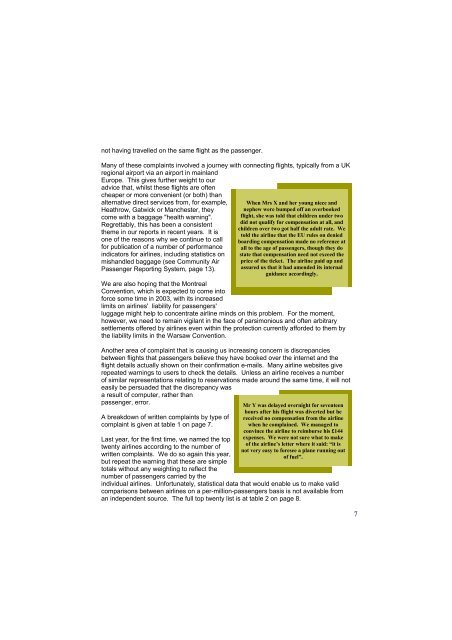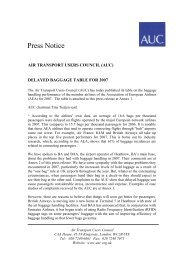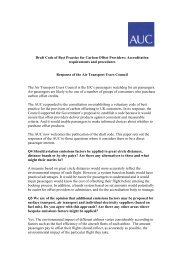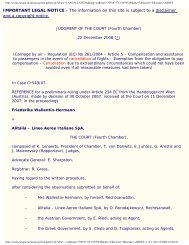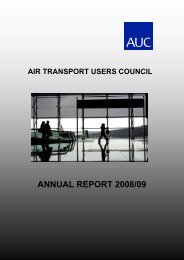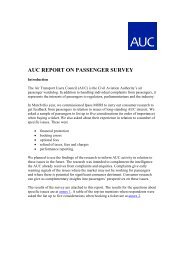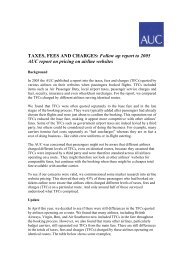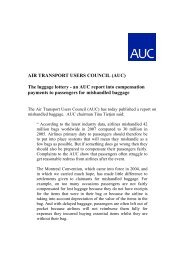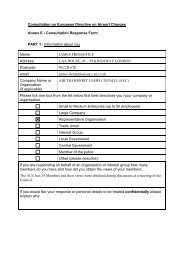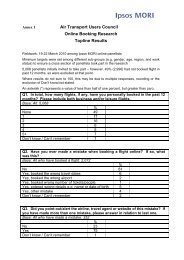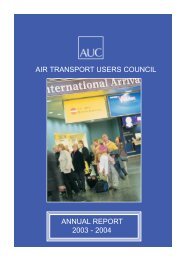Annual Report 2002—2003 - Air Transport Users Council
Annual Report 2002—2003 - Air Transport Users Council
Annual Report 2002—2003 - Air Transport Users Council
- No tags were found...
You also want an ePaper? Increase the reach of your titles
YUMPU automatically turns print PDFs into web optimized ePapers that Google loves.
not having travelled on the same flight as the passenger.Many of these complaints involved a journey with connecting flights, typically from a UKregional airport via an airport in mainlandEurope. This gives further weight to ouradvice that, whilst these flights are oftencheaper or more convenient (or both) thanalternative direct services from, for example,Heathrow, Gatwick or Manchester, theycome with a baggage "health warning".Regrettably, this has been a consistenttheme in our reports in recent years. It isone of the reasons why we continue to callfor publication of a number of performanceindicators for airlines, including statistics onmishandled baggage (see Community <strong>Air</strong>Passenger <strong>Report</strong>ing System, page 13).We are also hoping that the MontrealConvention, which is expected to come intoforce some time in 2003, with its increasedlimits on airlines' liability for passengers'luggage might help to concentrate airline minds on this problem. For the moment,however, we need to remain vigilant in the face of parsimonious and often arbitrarysettlements offered by airlines even within the protection currently afforded to them bythe liability limits in the Warsaw Convention.Another area of complaint that is causing us increasing concern is discrepanciesbetween flights that passengers believe they have booked over the internet and theflight details actually shown on their confirmation e-mails. Many airline websites giverepeated warnings to users to check the details. Unless an airline receives a numberof similar representations relating to reservations made around the same time, it will noteasily be persuaded that the discrepancy wasa result of computer, rather thanpassenger, error.A breakdown of written complaints by type ofcomplaint is given at table 1 on page 7.Last year, for the first time, we named the toptwenty airlines according to the number ofwritten complaints. We do so again this year,but repeat the warning that these are simpletotals without any weighting to reflect thenumber of passengers carried by theWhen Mrs X and her young niece andnephew were bumped off an overbookedflight, she was told that children under twodid not qualify for compensation at all, andchildren over two got half the adult rate. Wetold the airline that the EU rules on deniedboarding compensation made no reference atall to the age of passengers, though they dostate that compensation need not exceed theprice of the ticket. The airline paid up andassured us that it had amended its internalguidance accordingly.Mr Y was delayed overnight for seventeenhours after his flight was diverted but hereceived no compensation from the airlinewhen he complained. We managed toconvince the airline to reimburse his £144expenses. We were not sure what to makeof the airline’s letter where it said: “it isnot very easy to foresee a plane running outof fuel”.individual airlines. Unfortunately, statistical data that would enable us to make validcomparisons between airlines on a per-million-passengers basis is not available froman independent source. The full top twenty list is at table 2 on page 8.7


